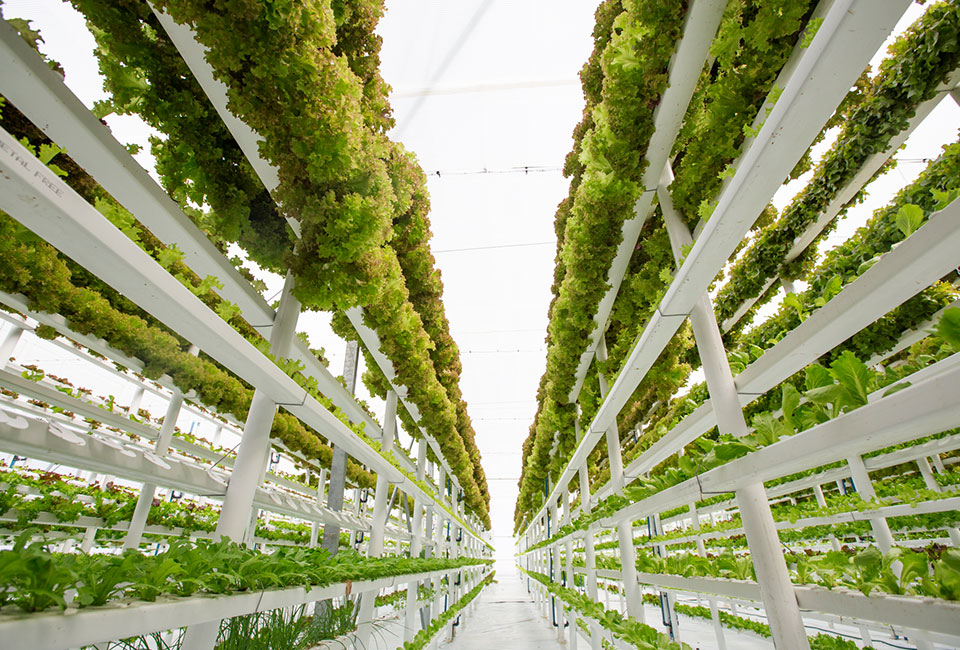
In order to be able to feed a growing world population under difficult climatic and political conditions, there is a need forincreased investment in resource-conserving food production. Vertical farming is one approach to this.
The global food system has weaknesses that the Ukraine war has exposed. For example, the high dependence on large agricultural producing and exporting countries and their supply capabilities. Ukraine and Russia, for example, are among the world's top grain producers. Nearly 50 countries depend on Russia and Ukraine for at least 30% of their grain needs. The two countries produce one-third of the world's wheat and other key components of the world's food supply, such as sunflower oil and fertilizer. A partial loss of Russian fertilizer and food exports, compounded by massive restrictions on Ukrainian grain supplies, threatens many developing and emerging countries with hunger, anger, and political destabilization. Therefore, more investments should be made in technologies that enable resource-saving food production, propagates Dr. Heinz-Werner Rapp, founder, and head of the German think tank 'FERI Cognitive Finance Institute'. The latter has written a new study (cf. PDF) on the subject of "Vertical Farming", which is intended to provide a novel approach to food production.
Climate change is a key risk factor
However, global climate change is coming into focus as a key risk factor for world food supplies: increasing periods of drought, severe weather and other extreme climatic events will threaten large parts of traditional agriculture in the future. These developments will have a decisive impact on the coming decades.
Innovative processes are needed for food production
Alternative ways of producing food are becoming increasingly important in order to be able to guarantee sufficient supplies for a growing world population. Novel processes and innovative technologies play an essential role in this. The combination of modern approaches such as robotics, sensor technology, artificial intelligence, and digital image processing, for example, should enable more sustainable and resource-conserving food production in the future, which is also in line with the Paris climate targets.
Vertical farming delivers a novel approach to production
According to the study, vertical farming is a special form of urban agriculture that enables highly automated production of essential foodstuffs year-round indoors under controlled environmental conditions. In addition to crops and food plants, fungi or animal protein sources such as shrimp can also be integrated into vertical farming systems. The cultivation process can be optimized with the help of artificial intelligence and robotics, with light, water and other resources being continuously supplied as needed. Vertical farming thus offers a wide range of ecological advantages and enables resource-conserving food production close to the end consumer. The authors consider vertical farming to be particularly attractive for areas with rapid population growth, small areas under cultivation, high purchasing power and strong urbanization, such as Singapore at present.
Production costs are crucial
For vertical farm-based food production, the long-term competitiveness of production costs compared to traditional agriculture is crucial, the authors emphasize. Rising energy and transport costs, growing climate risks and the increasing scarcity of good agricultural land are factors that make vertical farming concepts increasingly attractive. They concede that fully automated indoor farms cannot replace conventional farming. But they would be a sensible and promising addition.
The vertical farming industry is expected to develop dynamically
According to forecasts, the vertical farming industry is set to develop very dynamically in the coming years: The authors cite figures showing that the market volume is expected to increase fivefold from $4.16 billion in 2022 to $20.91 billion in 2029. According to Julia Bahlmann, author of the study, building critical farm sizes will be crucial for vertical farms in the future. Starting with small companies and startups, she therefore expects increased consolidation in the market. But FERI board member Rapp is convinced: "This special dynamic and the enormous future potential, also in the context of the overarching megatrend 'Alternative Food', will open up attractive investment opportunities for strategic investors in the future, especially in the private markets sector."